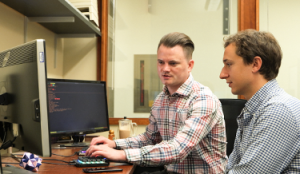We are getting a lot of questions about email forwarding issues. We are not disabling email forwarding for @uw.edu domains, but you may still be affected by actions being taken by commercial email companies. Stay informed!
UW-IT News
Microsoft Teams chat retention changes on May 1
Chat messages in MS Teams (not channel posts) will be subject to compliance with UW Records Management policy for transitory (brainstorming & collaboration) communications starting May 1, 2024. Chats will expire after 30 days.
New UW-IT infrastructure directors take on critical roles to better serve UW
Three units within UW-IT’s Infrastructure Division critical to the University of Washington’s business functions now have new leaders — a key step in a major reorganization that was completed in late 2023.
Scott Bingham is Director of Microsoft Platforms, a new unit in UW-IT; David Cox is Director of Computing and Storage; Joby Walker is Director of Infrastructure Tools.
Strengthening UW’s partnership with Microsoft
UW students, faculty and staff rely on multiple IT tools and apps to accomplish their work, but over the years, as the University has sought to streamline its offerings, Microsoft tools have grown in importance.

“With our new Microsoft Platforms unit, we aim to elevate our partnership with Microsoft and maximize the value of Microsoft technologies for University business,” said Bin Guo, Infrastructure’s associate vice president.
“Scott will help us to strengthen our partnership with Microsoft, and at the same time, work with other UW-IT teams to curate relevant Microsoft technologies and continue to deliver premium services to our community,” she said.
Scott brings broad technical expertise across applications, infrastructure, program and project management, and IT operations. “And he is proficient in bringing together technology and business strategy to solve unique challenges,” she said.
Scott is no stranger to UW, where he received a Computer Science degree. He has more than 20 years of experience leading technology teams delivering high-value digital solutions and services.
For the last 12 years, he served in various IT leadership roles at Seattle Children’s, and most recently has led the IT Operations department, where he implemented and supported a large portfolio of digital solutions and services across the Hospital, Research Institute and 40 remote clinical sites.
Scott is also the founder and president of Housing Solutions for Hope (HS4H), a Seattle Children’s non-profit — showcasing his deep passion for Diversity, Equity, and Inclusion (DEI) in support of under-represented communities.
Cutting-edge computing and storage solutions coming to the UW
The Computing and Storage unit also will play a critical role as the University seeks new business solutions in the short- and long-term, Guo said.

“We are at a pivotal point of leading the university into the next era, and the Computing and Storage unit continues to play a key role in that journey,” Guo said.
“This includes a few major efforts like defining and driving the implementation of next generation student systems in collaboration with our partners in the Data and Applications Division, modernizing of our on-premises storage solutions and expanding our computing environment to the cloud.
David is well known around UW, where he has been contributing to its mission in different roles and capacities for more than 30 years — with outstanding results. He has diverse technical knowledge and experience as well as leading teams in various areas.
“It’s a super exciting journey ahead and we are glad to have David onboard,” she said.
Infrastructure tools key to smooth University business operations
The Infrastructure Tools team already has played an instrumental role in Finance Transformation by enabling UW Connect (ServiceNow) to be the enterprise customer support platform, Guo said.

Under Joby’s leadership, she expects the unit will continue to scale up the capabilities to enable more business workflows and onboard more university customers efficiently.
UW-IT also oversees a vast portfolio of tools to support the management of the backbone IT infrastructure for the university, including project management and developer tools. But as University priorities change, the Infrastructure Tools unit will play a key role in building a solid roadmap for years to come.
“Joby is perfect for this role,” Guo said. “He has been contributing to UW’s mission in different roles and capacities for more than two decades and he has a great track record of delivering outstanding results in an extremely collaborative and pragmatic manner.”
“He also brings diverse technical knowledge and experience and is a great example of the embodiment of our three core values — invested, compassionate and team player.”
“I am confident that Joby will help us lead through this growth and pave the way forward,” Guo said. “It’s a super exciting time.”
Leadership changes reflect UW-IT’s path to a dynamic future

In the past year, UW-IT has transformed itself and created new divisions and units, committing itself to a new work model focused on the people who depend on IT tools and services.
The new hires and units, Guo said, go a long way to fulfilling Infrastructure Division’s mandate. As part of its work, various units design, implement and support essential IT infrastructure services and technologies that are indispensable to carrying out the University’s mission.
They include the University’s wired and wireless networks, telecommunications services, computing and storage services, infrastructure tools and service delivery platforms. At the same time, Infrastructure works closely with other divisions in UW-IT to ensure the right IT solutions are in place. See where Infrastructure and its units fit within UW-IT.
“We are very excited to have such committed leaders in UW-IT,” Guo said. As UW-IT continues to position itself to better serve the University’s mission, we need a strong vision to get us there.”
New research computing division gets strong leader
By UW-IT News & Announcements
Xiao Zhu, a research computer expert with the knowhow to help other researchers across the University of Washington to meet their evolving computing needs, is UW-IT’s new Associate Vice President for Research Computing.
“It is my belief that Xiao will skillfully support the UW in its role as a world leader in research,” said Andreas Bohman, UW-IT’s Vice President for UW Information Technology and CIO. “I am also confident that Xiao’s commitment to fostering innovation, collaboration and diversity in higher education will be a significant contribution to the UW’s mission and vision.”
Zhu was chosen from among a strong field of finalists to lead the new Research Computing Division in UW-IT, which reorganized in the past year to better serve the University’s needs.
UW and UW-IT leaders recognize that research computing is a key differentiator for the UW and it needs to continue to grow in this area to meet the needs of an innovative and fast-moving research community.
The Research Computing Division’s primary mission is to empower and facilitate groundbreaking research, foster innovation and support researchers across the university.
One of its goals is to provide the best computing resources available, in-house tools and expertise and unwavering support to everyone, whether they’re seasoned researchers or students just getting under way.
Through its new division, UW-IT is committed to enabling best practices that not only enhance the quality of research outcomes but also mitigate funding risks associated with computational endeavors.
“I am thankful to everyone who participated in the selection process,” Bohman said. “I especially appreciate the work from the recruiting firm Next Generation Partners, LLC and the search committee chaired by Xiaosong Li, Associate Vice Provost for Research Cyberinfrastructure, and made up of leaders across the University.
Xiao’s experience, in both the private and public sectors, encompasses research computing leadership, deep technical expertise, and securing external funding for research infrastructure. Most recently, he served as Senior Technical Consulting Engineer at Intel, where he was immersed in innovative technologies that support research computing.
Xiao’s education includes earning a Ph.D. in Computational Chemistry from the University of Wisconsin-Madison and an MBA from Purdue University, his employer prior to Intel. Xiao also holds a Bachelor of Science in Polymer Materials and Engineering from the University of Science and Technology of China.
While at Purdue as a Senior Research Scientist, Xiao designed and delivered cost-effective services to meet the evolving cyberinfrastructure needs of researchers, including the deployment of GPU resources for ML/AI. He also played a pivotal role in securing over $20 million in funding from the National Science Foundation, which facilitated deployment of the Anvil Supercomputer for the national science and engineering community.
Additionally, at the Texas Advanced Computing Center, Xiao was instrumental in deploying and later enhancing one of the world’s most powerful supercomputers at the time, while providing support to scientific computing communities.
Keep Duo Mobile updated; Duo no longer supporting earlier mobile device operating systems
Android devices using operating systems 9, 8 and Apple devices using iOS version 13 or earlier will no longer be able to download the latest version of Duo Mobile nor receive Duo Mobile maintenance fixes and security updates, starting Feb. 9, 2023. Please keep Duo Mobile updated. Make sure your devices’ operating systems are up to date so that you can update Duo Mobile to its latest version, and so that your device can receive Duo’s security and maintenance fixes.
New Year, New Devices: Top Five Apps to Set Yourself Up for Success in 2024
Ring in the New Year with the ultimate digital toolbox for your new smartphones, tablets and laptops! The UW offers many software downloads for students, faculty and staff. But if you don’t know where to start, here are the top five to set yourself up for success with your new devices.
Students
1. Scout
Find study spots, campus food, and tech items with Scout, available as both web and mobile apps. Filter study spaces by criteria such as lighting, ambient noise, proximity to food and availability of amenities to find the perfect match at all three campuses.
Students, Faculty and Staff
2. MyUW
Get all things UW right at your fingertips with the MyUW mobile app. It’s perfect for accessing everyday resources without having to sign in with your UW NetID every time.
3. Husky OnNet
Husky OnNet is UW’s preferred VPN that allows you to connect to campus resources no matter where you are. With it, you’ll never have to worry about leaving your assignments, work or research behind!
4. Sophos Anti-Virus protection
Keep your fresh start secure by bolstering your defenses. Get Sophos Anti-Virus protection for free and install it on up to ten devices.
5. Duo
Last but not least, remember to set up Duo for 2FA on your new phone or tablet!
Besides these top must-haves, check out ITConnect for all your new tech needs! Still need help? Email us at help@uw.edu or start a chat with us online.
Making language models accessible to all
Video by Sam Han | Text by Ignacio Lobos | UW-IT Communications & Engagement

Something that easily gets lost when people talk about working with large language models such as ChatGPT is cost and the unbelievable amount of power needed to run them.
That’s where Tim Dettmers, a Ph.D. student at the University of Washington, comes in. His work is focused on machine learning and large language models, with the ultimate goal of making them more widely accessible to a larger field of researchers.
There are plenty of bright people all over the U.S. and the world who have a lot to contribute to the emerging language model field, but often they lack access to computational resources to do their own research.
But Dettmers has found a way to allow researchers to work with these large models on a simple laptop — and perhaps not too distant into the future, allowing you and I to train our own language models on our smart phones.
Learn what he is doing on this video about his work, and the future of language model research.
“What our research is showing is that you don’t need the expensive servers that can be like $50,000 or more expensive” to work with the largest of the language models now available, Dettmers said. “You can use a consumer (computer) so people can set up at home and use these things at home.”
But their work also extends beyond merely using open source language models. “You can take it and make it your own. You can personalize it, you can fine tune it on your data. This is very powerful,” he said.
“I want to make our work as widely accessible as possible for the people with the least resources … and accelerate research so we can figure out more things about language models and how to use them well,” he said.
Partnering with UW-IT to make it happen
Dettmers and his colleagues have been doing their research on Hyak, the University’s own supercomputer, which is managed by UW-IT. Hyak, Dettmers said, has accelerated their work and made it possible to use large language models — and to personalize them, which is an even more difficult undertaking.
“Research computing at the University of Washington is just a game changer,” Dettmers said. “We need so much computational resources in our research. Hyak (makes it possible) to do the work that we need to do in order to stay at the cutting edge.”
This fall, don’t forget to choose eduroam for your Wi-Fi needs
Eduroam is the preferred Wi-Fi connection to the UW’s network. It’s more secure and encrypted, using the latest technology. Eduroam can also be used across the globe.
How can you be safe and more secure online?
UW-IT’s annual cybersecurity message for 2023 was sent to all University of Washington (UW) students, faculty and staff and UW Medicine employees with approval from the Interim Chief Information Security Officer.
Set up your UW NetID recovery options
Add your mobile number and email address so if you forget your password or get locked out, you can regain access to your UW NetID.

